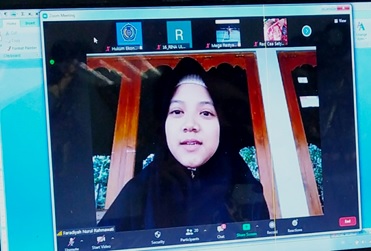Workshop model pembelajaran demokrasi guru sekolah dasar di Jawa Tengah
DOI:
https://doi.org/10.53088/penamas.v1i1.72Keywords:
Elementary level, Primary school teachers, Democracy learning modelAbstract
The aim of this community service is to provide a democracy learning model workshop for elementary school teachers in Central Java. This activity is to socialize and practice the skills of the democratic learning model at the elementary level. In this activity, 26 elementary school teachers participated by online (Zoom Application). This community service is carried out in the form of a workshop with the first stage in the form of lecturing, questions and answers, and discussions. While the next stage is in the form of practice. Based on the implementation of this community service, it can be concluded that: first, this workshop is able to improve the knowledge and skills of elementary school teachers in Central Java of democracy learning model. This workshop also produced a video product of the steps of the democracy learning model. This workshop was considered success because all participants participated fully.
References
Adler, S. A. (2008). 18 The education of social studies teachers. In Handbook of Research in Social Studies Education (pp. 329–351.). Routledge.
Carr, P. R. (2012). In Democracy, critical pedagogy and the education of educators. Information Age Publishing, Inc.
Castro, A. J. (2013). What makes a citizen? Critical and multicultural citizenship and preservice teachers’ understanding of citizenship skills. Theory Research in Social Education, 41(2), 219–246. https://doi.org/10.1080/00933104.2013.783522
Cochran-Smith, M. (2004). Walking the road: race, diversity, and social justice in teacher education (J. A. Banks (ed.)). Teachers College Press.
Gay, G. (2000). Culturally responsive teaching: theory, research, & practice (3rd ed.). Teachers College Press. https://www.tcpress.com/culturally-responsive-teaching-9780807758762
Harber, C., & Serf, J. (2006). Teacher education for a democratic society in England and South Africa. Teaching Teacher Education: An International Journal of Research and Studies, 22(8), 986–997. https://doi.org/10.1016/j.tate.2006.04.018
Journell, W. (2013). What preservice social studies teachers (don’t) know about politics and current events—and why it matters. Theory Research in Social Education, 41(3), 316–351. https://doi.org/10.1080/00933104.2013.812050
Kincheloe, J. L. (2004). The knowledges of teacher education: Developing a critical complex epistemology. Teacher Education Quarterly, 31(1), 49–66.
Kocoska, J. (2009). The student’s position in the democratic classroom. Procedia - Social and Behavioral Sciences. https://doi.org/10.1016/j.sbspro.2009.01.427
Kucukahmet, L. (2009). Sinif Yonetimi [Classroom management]. Pegem Akademi Yayincilik.
Ladson-Billings, G. (1995). But that’s just good teaching! The case for culturally relevant pedagogy. Theory Into Practice, 34(3), 159–165. https://doi.org/10.1080/00405849509543675
Leistyna, P., Lavandez, M., & Nelson, T. (2004). Introduction – critical pedagogy: revitalizing and democratizing teacher education. Teacher Education Quarterly, 31(1), 3–15.
Mathews, S. A., & Dilworth, P. P. (2008). Case studies of preservice teachers’ ideas about the role of multicultural citizenship education in social studies. Theory Research in Social Education, 36(4), 356–390. https://doi.org/10.1080/00933104.2008.10473380
North, C. E. (2009). Teaching for social justice? Voices from the front lines (1st ed.). Routledge. https://doi.org/10.4324/9781315631721
O’Brien, L. M. (2005). Social foundations of education and democracy: teacher education for the development of democratically oriented teachers. Educational Foundations, 19(3–4), 33–44.
Picower, B. (2012). Practice what you teach: social justice education in the classroom and the streets. Routledge. https://doi.org/10.4324/9780203118252
Rainer, J., & Guyton, E. (1999). Democratic practices in teacher education and the elementary classroom. Teaching and Teacher Education, 15(1), 121–132. https://doi.org/10.1016/S0742-051X(98)00039-0
Robertson, E. (2008). Teacher education in a democratic society: learning and teaching the practices of democratic participation (Handbook of research on teacher education) (M. Cochran-Smith, S. Feiman-Nemser, D. J. McIntyre, & K. E. Demers (eds.); 3rd ed.). Routledge. https://doi.org/10.4324/9780203938690.ch3
Samanci, O. (2010). Democracy Education in Elementary Schools. The Social Studies. https://doi.org/10.1080/00377990903285499
Shechtman, Z. (2002). Validation of the democratic teacher belief scale (dtbs). International Journal of Phytoremediation. https://doi.org/10.1080/0969594022000027672
Silva, D. Y., & Mason, T. C. (2003). Developing pedagogical content knowledge for civics in elementary teacher education. Theory Research in Social Education, 31(3), 366–397. https://doi.org/10.1080/00933104.2003.10473230
Sleeter, C. (2008). Equity, democracy, and neoliberal assaults on teacher education. Teaching and Teacher Education. Teaching and Teacher Education, 24(8), 1947–1957. https://doi.org/10.1016/j.tate.2008.04.003
Sleeter, C. E. (2008). Preparing White teachers for diverse students (Handbook of research on teacher education) (M. Cochran-Smith, S. Feiman-Nemser, D. J. McIntyre, & K. E. Demers (eds.); Handbook o). Routledge.
Slekar, T. D. (2009). Democracy denied: learning to teach history in elementary school. Teacher Education Quarterly, 36(1), 95–110.
Sunal, C. S., Kelley, L. A., & Sunal, D. W. (2009). Citizenship education in the elementary classroom: teacher candidates photograph and describe their perceptions. Journal of Social Studies Education, 33(1), 33–70.
Villegas, A. M., & Lucas, T. (2002). Educating culturally responsive teachers: a coherent approach. SUNY.
Zeichner, K. (2010). Rethinking the connections between campus courses and field experiences in college – and university-based teacher education. Journal of Teacher Education, 61(1–2), 89–99. https://doi.org/10.1177/0022487109347671
Zeichner, K. M. (2009). Teacher education and the struggle for social justice. Routledge. https://doi.org/10.4324/9780203878767

Downloads
Published
How to Cite
Issue
Section
License
Authors who publish with this journal agree to the following terms:
The author(s) retain copyright and grant the journal the right of first publication with the work simultaneously licensed under a CC BY-SA 4.0 license that allows others to remix, adapt, and build upon the work even for commercial purposes, as long as they credit the author(s) and license their new creations under the identical terms.
License details: https://creativecommons.org/licenses/by-sa/4.0/
Most read articles by the same author(s)
- Choirun Nisa, Fitri Puji Rahmawati, Honest Ummi Kaltsum, Muhamad Taufik Hidayat, Penguatan kompetensi Guru SD melalui integrasi teknologi AR dan AI dalam pembelajaran , Penamas: Journal of Community Service: Vol. 4 No. 1 (2024): Penamas: Journal of Community Service
- Arief Cahyo Utomo, Ajib Rosyadi, Amelia Wahyu Sejati, Frida Fembriani Candradewi, Muhammad Rasyid Affandi, Muhamad Taufik Hidayat, Muhroji Muhroji, Pelatihan pembelajaran efektif berbasis TSAC bagi Guru sekolah dasar di Jawa Tengah , Penamas: Journal of Community Service: Vol. 1 No. 1 (2021): Penamas: Journal of Community Service
- Honest Ummi Kaltsum, Muhamad Taufik Hidayat, Wili Astuti, Peningkatan profesionalisme guru melalui pelatihan model belajar bahasa inggris daily language , Penamas: Journal of Community Service: Vol. 2 No. 2 (2022): Penamas: Journal of Community Service


